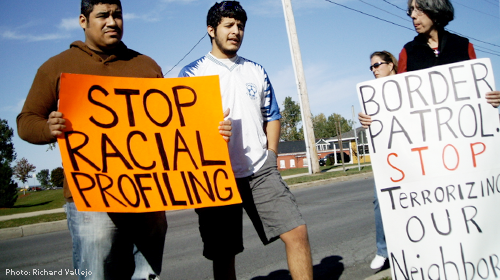
Which American police force had between 2005 and 2012?
Hint: It’s the same one that was responsible for with private individuals since 2010, without a single instance of public accountability. It’s also the one that claims authority to reduce Americans’ constitutional rights within 100 miles of any external land or sea boundary.
No idea? The agency I’m talking about is Customs and Border Protection (CBP).
It’s a little known fact that CBP is the largest law enforcement agency in the country, with more than 21,000 port-of-entry officers and 21,000 Border Patrol agents. What’s becoming clearer all the time is that CBP is a police force in crisis. According to its former head of Internal Affairs, James F. Tomsheck, thousands of CBP personnel hired in the last decade’s massive growth are “.” Furthermore, he says seven or more of CBP’s are “highly suspect.”
CBP’s pattern of abuse and misconduct is exacerbated by an unprecedented militarization of our borders. Rep. Hal Rogers (R-Ky.), chairman of the House Appropriations Committee, has called border spending – on everything from drone surveillance to equipment intended for war zones – a “.” In this context, the last thing I’d expect as a Las Cruces, New Mexico-based advocate for border communities is more enforcement resources.
President Obama and Homeland Security Secretary Jeh Johnson are readying the country for another “surge” in border-security resources as part of the administration’s welcome announcement of administrative relief for undocumented immigrants. But their plan isn’t rooted in true border- security needs: The administration has regularly touted its tough enforcement record as producing the most secure border in American history. Nor was this summer’s migration of families and children fleeing violence in Central America a border-security problem: CBP leadership correctly identified moms and kids turning themselves in as a humanitarian matter.
The president and his top officials seem to be accepting a mistaken perception of border communities. Rather than celebrating these communities’ , economic vitality, and diversity, the administration has treated border residents as second-class citizens, suspects rather than people deserving equal respect and dignity. President Obama needs to make clear that he will not increase the number of Border Patrol agents or otherwise worsen the effect of border security on our communities.
The president’s new immigration plan is an opportunity to ameliorate CBP’s dismal six-year track record under his watch. He can bring CBP in line with best police practices using the agency’s fresh leadership. He can stop the daily harassment of U.S. citizens and lawful residents at interior CBP , end racial profiling and brutal treatment meted out by CBP far from any border, and eradicate abusive, demeaning behavior by some port-of-entry officers.
Border communities have long promoted an affirmative agenda to reform CBP through transparency and oversight reforms including body-worn cameras, reduction of the 100-mile zone, and improved complaint and custody policies. The president should not succumb to uninformed pressure about the border, but act with a vision to the militarized zone of heavy-handed law enforcement our communities have become. His pledge to bring humane enforcement to DHS operations won’t be realized if he increases border-security resources at the height of CBP’s problems.
As border residents, we’re tired of being forsaken.
See ACLU’s webpage, Border Communities Under Siege at /border-communities-under-siege-border-patrol-agents-ride-roughshod-over-civil-rights
Learn more about immigration and customs enforcement and other civil liberties issues: Sign up for breaking news alerts, , and .

